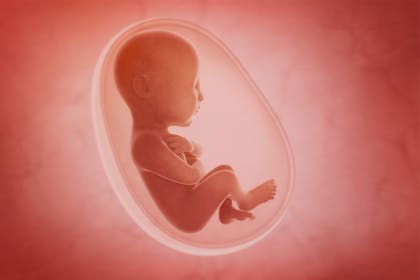7 surprising sensations your baby can feel while in the womb

This page contains affiliate links, which means we may earn a small amount of money if a reader clicks through and makes a purchase. All our articles and reviews are written independently by the Netmums editorial team.
Think babies are totally unaware of the outside world until they make their grand entrance? Think again. Here are seven amazing things that babies can feel while in the womb!
Babies are busy developing from the moment of conception.
You may think they’re completely cocooned from the outside world, but here are the surprising sensations that your growing baby is very aware of when they’re in the womb ...
1 They sense their mother's touch
If you like to rub your bump, evidence suggests your baby knows – and will respond.
FREE NEWBORN NAPPIES
Researchers from Dundee University studied 23 women who were between 21 weeks to 33 weeks pregnant.
The women were asked to try three activities: reading stories to their babies, stroking their bellies, and basically doing nothing – the mothers laid still with their hands at their sides.
The results revealed that touch was the activity which stimulated the unborn babies the most – they responded by moving around.
The older the fetus was, the more marked the movement was.

2 They can tune into music
Yep, really! Babies can begin to hear at about 18 weeks into their development, and it gradually improves. Research indicates that babies get used to the music and voices they've heard in the womb.
For example, one small study from the University of Helsinki asked 10 expectant mothers to play 'Twinkle Twinkle Little Star' at full volume a few times a week during the last trimester of pregnancy.
When the babies were born, tests designed to measure brain activity showed babies who’d listened to the nursery rhyme revealed patterns of recognition in their brains months after birth, compared to babies who hadn’t been exposed to the song.
If you listen to the same song a lot during pregnancy, that same song may even help to soothe your baby after the birth!
Your baby will also recognise your voice soon after the birth, and will love hearing you (and your partner, if you have one) talk, sing and read to them.
3 They don't like smoking
We know smoking is not good for mum or baby. There’s also evidence that suggests puffing on ciggies is also something your baby reacts to, and recognises when it happens.
A UK study of 20 pregnant women has revealed fetuses reacted a certain way when their mums smoked.
Moving 4D scan images, taken at 24, 28, 32 and 36 weeks, showed thousands of tiny movements in the womb. They found that babies whose mothers smoked showed significantly higher rates of mouth movement and self-touching than those carried by non-smokers.
Researchers aren't sure why this should be, but one theory is that this is a stress response.
If you smoke, find out how it affects your baby and get help to quit.
4 They react to light
Babies' eyes start to become sensitive to light at just 15 weeks.
Their eyes will still be closed at this stage, but they may detect a bright light outside your tummy.
You could try shining a torch on your bump, and seeing if your baby responds by moving around more.
5 They're developing their taste buds
Scientists have known for a while that what mum eats influences baby’s tastebuds, which develop in the womb at week nine of pregnancy.
One study involved giving a group of mums carrot juice to drink – some in their third trimester, and others in the first few weeks of breastfeeding. A third group of mums had no carrot juice at all.
The results showed that the babies of mums who had drunk carrot juice went on to happily eat more carrots during weaning than the babies who weren't exposed to any carrots.
During pregnancy, the flavours of the food you eat can pass to your baby through the amniotic fluid that surrounds them. After pregnancy, what you eat may affect the flavour of your breastmilk.
So start to love carrots and other healthy foods, and say no to junk!
6 A cold glass of water makes them shiver
If you’ve ever had a moment where you can’t feel baby’s kicks, your midwife might recommend you drink a glass of cold water.
It's a trick sonographers sometimes use to get baby moving. The cold temperature could wake your baby up a bit!
If you notice a reduction in your baby's movements though, don't wait; report it to your midwife straight away.
7 And even fetuses get the hiccups!
Fetuses experience hiccups from as early as the first trimester, but more commonly from the second and third. They’re pretty common.
You might experience your baby’s hiccups as little spasms in your tummy. They’ll feel a little different to the usual butterfly movements.
You might even be able to see your tummy comically jerking as your baby hiccups and jumps every few seconds – as you would if you had the hiccups, too.
What to Expect When You're Expecting by Heidi Murkoff is a must-read book for all expectant parents. See more details here at Amazon.
You can also buy it here at Waterstones.
Have you had any funny experiences or sensations while pregnant? Share them over on our forum:




